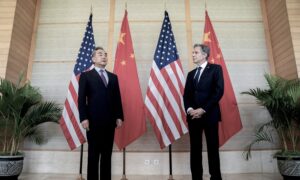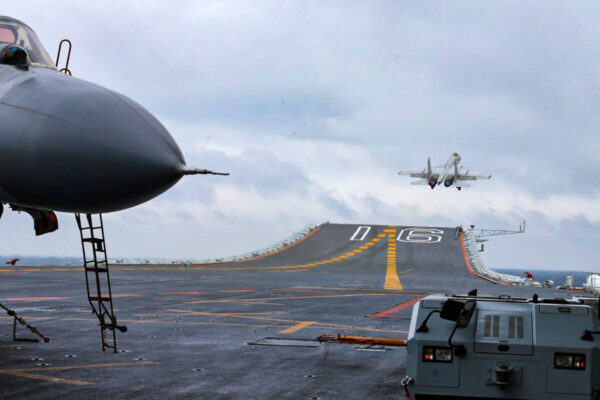China’s Military Aid to Russia: Finally Breaking Decades of America’s Engagement Policy?
Commentary At the annual Munich Security Conference, U.S. Secretary of State Antony Blinken warned his Chinese counterpart, Chinese Communist Party Central Foreign Affairs Office Director Wang Yi, against providing “lethal support” to Russia in its war against Ukraine. This was the first meeting between senior Chinese and U.S. officials since the Chinese spy balloon was downed. Blinken noted that China already provides non-lethal aid to Russia, buys its oil, and helps it overcome the sanctions regime put in place after the invasion. The Munich meetings and President Joe Biden’s visit to Kyiv were notable for four reasons. First, according to Chinese accounts of the Blinken-Yang meeting, Beijing said it would never allow the United States to dictate the terms of its relations with Russia. Second, Blinken stated that China must never again send a balloon over U.S. territory. This now requires the United States to police its airspace rigorously, which it should have been doing all along. Third, Wang also met with European Union foreign policy head Josef Borrell, who stated that the EU and China were not “rivals but partners.” The ambiguity of the EU regarding the China threat does not help Ukraine, the United States, or the EU itself. Lastly, the reciprocal visit to the warring capitals—Biden to Kyiv and Chinese officials to Moscow—to mark the first anniversary of the Russia-Ukraine war shows the nature of the deepening proxy war. Despite Blinken’s remarks, the Chinese retort is closer to the mark. China will not let the United States set the parameters of its assistance to Russia. In fact, China is already providing military support to Russia—it is only doing it covertly. Were China overtly to provide arms and ammunition to Russia, it would be impossible to ignore and a painful reminder to Kyiv and Washington of the astronomical costs of aiding Chinese economic and military growth. Those costs are now beginning to bite. Chinese J-15 fighter jets being launched from the deck of the Liaoning aircraft carrier during military drills in the South China Sea on Jan. 2, 2017. (STR/AFP via Getty Images) In the decades before the war, Ukraine transferred considerable military technology to China. This included the aircraft carrier Liaoning—the same carrier that strengthens China’s ability to project power and that recently conducted exercises, including simulated attacks against Japan and U.S. bases on Guam. If it did not already, the fact that China might openly aid Russia with arms and ammunition—and likely in greater amounts than it has thus far—should make Kyiv rue the day it helped China’s communist regime strengthen. It would also be supremely foolish for China to do so, especially soon after the balloon. This is because it needlessly runs the risk that the American foreign policy establishment would be forced to abandon its favored policy of cooperation and engagement with China and finally recognize the full scope of the China threat. This is despite decades of the development of that threat and countless developments and warnings that this was occurring. The fact that China, Russia, and South Africa are to conduct naval exercises off the South African coast is just another indication of this—just another finger in Uncle Sam’s eye. In a terrible and appalling case of you reap what you sow, for decades, the American foreign policy establishment conducted a major exercise in threat deflation regarding the China threat. Year after year, the Chinese regime became stronger and a greater threat. Year after year, this was explained away by the foreign policy establishment, U.S. government, foundations, media, think tanks, and sinologists. The balloon incident threatened to overturn the apple cart. Its seemingly serene sojourn, daily taunting of the Biden administration, carries the risk that the American elite can no longer ignore or minimize the threat. So they will have to end their policy of engagement with China. Given that Vladimir Putin’s regime is the idée fixe of the American foreign policy establishment, China’s transfer of arms and ammunition to Russia runs a risk for China: Beijing’s aid to Moscow will force the American foreign policy elite to abandon their willful ignorance. They will end their Rip van Winkle slumber concerning the dangers the Chinese regime poses to the United States, its allies, and global interest. In sum, China’s open military aid to Russia will be the proverbial straw that compels the bulk of the American foreign policy establishment to do what they are loath to do: confront the Chinese Communist Party. That would be the silver lining of overt Chinese military aid to Russia. It would also be welcome news for an accurate understanding of the China threat if, through aid, Moscow, China’s own aggressive actions, as well as its gormless and childish impatience to aid Putin’s regime, overturn the liberal order and end the United States’ global position, causing the American

Commentary
At the annual Munich Security Conference, U.S. Secretary of State Antony Blinken warned his Chinese counterpart, Chinese Communist Party Central Foreign Affairs Office Director Wang Yi, against providing “lethal support” to Russia in its war against Ukraine. This was the first meeting between senior Chinese and U.S. officials since the Chinese spy balloon was downed.
Blinken noted that China already provides non-lethal aid to Russia, buys its oil, and helps it overcome the sanctions regime put in place after the invasion. The Munich meetings and President Joe Biden’s visit to Kyiv were notable for four reasons.
First, according to Chinese accounts of the Blinken-Yang meeting, Beijing said it would never allow the United States to dictate the terms of its relations with Russia.
Second, Blinken stated that China must never again send a balloon over U.S. territory. This now requires the United States to police its airspace rigorously, which it should have been doing all along.
Third, Wang also met with European Union foreign policy head Josef Borrell, who stated that the EU and China were not “rivals but partners.” The ambiguity of the EU regarding the China threat does not help Ukraine, the United States, or the EU itself.
Lastly, the reciprocal visit to the warring capitals—Biden to Kyiv and Chinese officials to Moscow—to mark the first anniversary of the Russia-Ukraine war shows the nature of the deepening proxy war.
Despite Blinken’s remarks, the Chinese retort is closer to the mark. China will not let the United States set the parameters of its assistance to Russia. In fact, China is already providing military support to Russia—it is only doing it covertly. Were China overtly to provide arms and ammunition to Russia, it would be impossible to ignore and a painful reminder to Kyiv and Washington of the astronomical costs of aiding Chinese economic and military growth. Those costs are now beginning to bite.

In the decades before the war, Ukraine transferred considerable military technology to China. This included the aircraft carrier Liaoning—the same carrier that strengthens China’s ability to project power and that recently conducted exercises, including simulated attacks against Japan and U.S. bases on Guam. If it did not already, the fact that China might openly aid Russia with arms and ammunition—and likely in greater amounts than it has thus far—should make Kyiv rue the day it helped China’s communist regime strengthen.
It would also be supremely foolish for China to do so, especially soon after the balloon. This is because it needlessly runs the risk that the American foreign policy establishment would be forced to abandon its favored policy of cooperation and engagement with China and finally recognize the full scope of the China threat. This is despite decades of the development of that threat and countless developments and warnings that this was occurring. The fact that China, Russia, and South Africa are to conduct naval exercises off the South African coast is just another indication of this—just another finger in Uncle Sam’s eye.
In a terrible and appalling case of you reap what you sow, for decades, the American foreign policy establishment conducted a major exercise in threat deflation regarding the China threat. Year after year, the Chinese regime became stronger and a greater threat. Year after year, this was explained away by the foreign policy establishment, U.S. government, foundations, media, think tanks, and sinologists. The balloon incident threatened to overturn the apple cart. Its seemingly serene sojourn, daily taunting of the Biden administration, carries the risk that the American elite can no longer ignore or minimize the threat. So they will have to end their policy of engagement with China.
Given that Vladimir Putin’s regime is the idée fixe of the American foreign policy establishment, China’s transfer of arms and ammunition to Russia runs a risk for China: Beijing’s aid to Moscow will force the American foreign policy elite to abandon their willful ignorance. They will end their Rip van Winkle slumber concerning the dangers the Chinese regime poses to the United States, its allies, and global interest. In sum, China’s open military aid to Russia will be the proverbial straw that compels the bulk of the American foreign policy establishment to do what they are loath to do: confront the Chinese Communist Party. That would be the silver lining of overt Chinese military aid to Russia.
It would also be welcome news for an accurate understanding of the China threat if, through aid, Moscow, China’s own aggressive actions, as well as its gormless and childish impatience to aid Putin’s regime, overturn the liberal order and end the United States’ global position, causing the American foreign policy establishment to yield to reality.
According to a State Department spokesman, Blinken told Wang that the United States was not looking for a new cold war. This brings to mind Trotsky’s attributed observation that “you might not be interested in war, but war is interested in you.” Whether Biden and Blinken seek a new cold war, they are in one. It is time to act like it.
Views expressed in this article are the opinions of the author and do not necessarily reflect the views of The Epoch Times.












